By Sally Kestin and John Maines, AVL Watchdog
African-Americans in Asheville are three times more likely than white drivers to be searched by police in traffic stops and are disproportionately charged with common crimes such as marijuana possession in disparities that experts in police bias called shocking, an AVL Watchdog analysis of police data found.
Among lower-level crimes such as disorderly conduct, trespassing and resisting an officer — offenses where police have broad discretion — Black people account for 33%-40% of the charges while representing just 12% of the city’s population, according to the analysis of arrests posted on the city’s web site from 2012 through early this month.
The data suggest that Asheville, which is on its fifth police chief in nine years, has failed to guarantee equal treatment under the law for all its citizens.
“These numbers raise serious concerns about discriminatory policing,” said Roy L. Austin, former Deputy Assistant Attorney General in the U.S. Justice Department’s Civil Rights Division, who oversaw federal investigations of racial profiling and misconduct in police agencies.
“While further analysis is certainly appropriate, these numbers cause me to pause,” Austin said, “for their sheer disproportion to the population of Blacks living in the community.”
New Asheville Police Chief David Zack, whose first four months on the job have included the pandemic and massive protests over police treatment of African-Americans, said he’s still examining the department to determine “what we’re doing well and what we need to work on.”
“Certainly, this is really important data that has to be addressed,” he said. “This sort of data is a major concern.”
In cities across America, Black people are disproportionately stopped by police and arrested for certain crimes, research shows. But Asheville stands out by some measures.
Black motorists stopped by Asheville Police last year were three times more likely than white drivers to be searched, according to statistics on Open Data Policing, a project of the Southern Coalition for Social Justice. For three years straight, Asheville has had the highest rate of African-American motorists searched of the 12 largest cities in North Carolina, the data show.
“We’re racially profiled. Period,” said Dee Williams, former chairwoman of the local NAACP’s criminal justice reform committee, who first alerted city leaders to racial disparities in traffic stops four years ago.
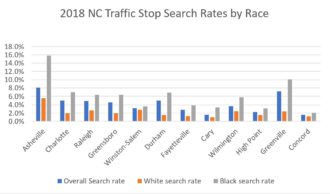
In response to those concerns, the police department began analyzing its own traffic stops in quarterly reports. The most recent, done in April, found no “unexplained disparities” and said officers are “encouraged to focus on problem areas that generate a disproportionate volume of calls, crimes and vehicle crashes/traffic safety concerns.”
Many of the African-American motorists were stopped in areas with “high populations of Black residents,” the report states. “These neighborhoods also represent the highest concentration of violent crimes.”
For years, the department has focused patrols in the largely African-American public housing areas, a police union official said.
“There’s no other place in Asheville that you have the quantity of officers that are concentrated in one area,” said Rondell Lance, president of the Fraternal Order of Police Lodge 1 in Asheville.
“All you do is stay in that housing project for your whole shift, and you’ve got to justify it,” Lance said. “You’re measured by how many citations did you write, how many people did you arrest?”
Zack did not respond to requests for comment on Lance’s suggestion that officers have been pressured to make arrests.
City Manager Debra Campbell, Zack’s boss, referred questions to the chief but said in an email, “I have been and continue to be concerned about this data and it is something that the city and the police department have been working on. This is why the newly hired chief of police has recommended numerous reforms in the department and is also why we recently initiated a newly adopted written Consent to Search policy.”
Highly Discretionary
One cr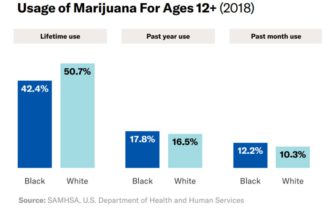 ime where arrest rates should be comparable among the whole population is marijuana possession. Annual surveys by the federal government show Black people report using marijuana at about the same rate as white people.
ime where arrest rates should be comparable among the whole population is marijuana possession. Annual surveys by the federal government show Black people report using marijuana at about the same rate as white people.
Yet African-Americans have accounted for 39% of Asheville Police charges for misdemeanor marijuana possession since 2012. In recent years, the percentage has climbed: 41% in 2018 and 46% in 2019.
“To see Black [marijuana] possession arrests at more than three times the Black population is shocking,” said Austin, who was President Barack Obama’s criminal justice adviser and worked with the President’s Task Force on 21st Century Policing.
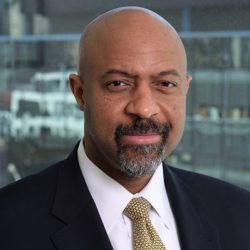
Austin also noted racial disparities in Asheville arrests for common misdemeanor crimes, charges that he said are considered “highly discretionary.”
Since 2012, African-Americans arrested by Asheville Police accounted for:
- 33% of the trespassing charges.
- 40% of the disorderly conduct charges.
- 36% of the resisting officer arrests.
- 20% of the liquor law offenses, such as possessing an open container of alcohol.
Disorderly conduct and resisting arrest “are often charged for what is deemed ‘contempt of cop’ behavior,’ ” Austin said. “The officer doesn’t like the person’s attitude so largely makes up a criminal offense as punishment.”
Most of the people in the analysis, of all races, were arrested on more than one charge and often for more serious crimes such as assault or breaking and entering along with resisting an officer or marijuana possession. But even among those arrested on a single discretionary charge, trespassing alone, for example, the percentages for African-Americans were nearly identical to those with other charges and in some cases even higher.
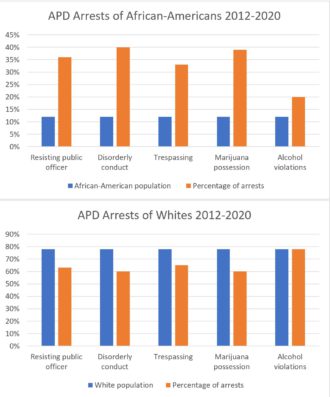
Graphic by AVL Watchdog, data from the Asheville Police Department
The Asheville Citizen-Times analyzed data through mid-2018 on arrests for resisting an officer, which can include giving false information or running away, and found 35% were Black people.
Frank Baumgartner, a professor of political science at the University of North Carolina at Chapel Hill who studies racial inequities in police data, called Asheville’s arrest disparities “shocking.”
“They’re just huge,” he said. “They’re not because of some bad-apple officer who’s got racial animus.”
One factor may be a mismatch in the makeup of Asheville’s police force to its residents. Zack said the city has 238 sworn officers, and a police spokeswoman said 5% are African-American, which would be 12.
“There is no question that diversifying the ranks of police has been a challenge nationwide,” Baumgartner said, “and that it is an important element of delivering equitable service to all members of the community.”
Policing patterns also play a role.
“What we do is put the police in what they call the high-crime areas and have them be very aggressive and then keep the police out of the high-income, middle-class areas,” Baumgartner said. “And when they’re in those nice areas of town, they’re very genteel and sort of hands-off so your odds of being discovered by the police are just really different.”
That difference in enforcement is noticeable in common offenses like traffic violations, he said. “Everybody speeds, and everybody rolls through stop signs.”
Gene Bell, the retired director of the Asheville Housing Authority and an African-American, said he was stopped by an Asheville officer a couple of years ago.
“He said, ‘You just had a rolling stop,’ ” Bell said. “I said, ‘You can’t roll and stop at the same time.’ ”
The officer’s response, according to Bell: “You’re a smart-ass. I’m going to give you a ticket.”

Bell said he hired a lawyer, and the ticket was dismissed.
Of motorists cited by Asheville Police for running a stop sign since 2012, 18% were Black people, according to citation data on the city’s website.
Zack said he had already identified discriminatory policing as a potential problem. “I think any new chief coming into any new municipality, that’s got to be a primary concern, and it’s certainly on the radar, without question.”
He plans a deeper analysis of the disparity in arrests. Marijuana possession, he said, has long posed a conundrum for police.
“What do you do if someone’s in possession and you’ve arrested them for shoplifting?” Zack said. “You’re not going to let them walk out with it.”
The chief announced at a June 9 City Council meeting a restructuring of the police department and a 90-day reform plan that includes eliminating the drug suppression unit.
“We’re spending far too much time expending effort on low-level drug offenses,” he told AVL Watchdog, adding that officers will be concentrating “more on property crimes and violent crime. I think the drug suppression unit contributes to some of these high numbers.”
Lance, the head of the police union, said he believes the department has overpoliced public housing and emphasized “the law enforcement part more than the peace officer.”
“When they put officers inside housing complexes, you could be out and play ball with the kids, walk through the neighborhood, but how do you put that on paper?” he said.
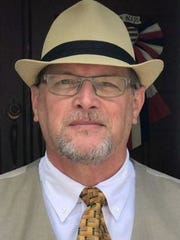
Officers, he said, have felt pressured by supervisors to strictly enforce the law. “You’d get two people sitting out there drinking, maybe smoking a joint. If word got back that you didn’t write a citation, that you just talked to them, told them to pour the beer out and grind the marijuana into the ground and not be caught again, a lot of times that was frowned upon.”
For years, the federal government provided safety grants that Asheville Police used partly for additional off-duty assignments in public housing at time-and-a-half pay, Lance said.
“Did officers need to be in there as much as we were in the past 20 or 25 years? I don’t think so,” he said. “We’ve been told for years to be in there. We’ve been paid extra money to go in there. It’s the combination of it all.”
David Nash, executive director of the Asheville Housing Authority, said that while police have always had a strong presence in public housing, including the current team of eight officers and a sergeant, the emphasis in recent years is on building relationships with residents and reserving arrests for the more serious crimes.
“It is not the message being sent by the Housing Authority to just round people up and charge them, and hasn’t been for a long time,” he said.
Policing in the housing complexes may explain some of Asheville’s racial disparity in arrests, Nash said. “I don’t think it’s exclusively public housing.”
Asheville, Bell said, remains “grossly segregated. If you go to a housing development, or you go to Shiloh, it’s easy to arrest Black people.”
City Council Responds
AVL Watchdog asked all seven Asheville City Council members for a telephone interview about the arrest data. Only one, Vijay Kapoor, agreed.
“Anyone who looks at those numbers should have serious concerns,” he said. “I certainly do, and I think every member of Council does. I think the question we should be asking is why? I don’t have an answer. That’s something we need to get to the bottom of.”
Mayor Esther Manheimer declined an interview but wrote in an email: “Because of Asheville’s arrest rate and traffic stop disparities, the council has been pushing for reforms to address these inequities.” She cited a policy adopted last fall to require written consent for searches.
Council member Julie Mayfield also sent an email. “I am not familiar with the data as it’s been some time since any was presented to us at council. If our data continues to show a problem with racially discriminatory enforcement or stops, then we need to focus in on that like a laser and address it.”
Kapoor said he once did a ride-along with police in the Lee Walker Heights public housing apartments. “In talking to a lot of folks outside their doors, they were expressing a concern about crime there and were requesting additional police protection.”
He said Asheville and the nation are at a turning point with the protests over racism and the treatment of African-Americans.
“I think there’s a renewed realization that their interactions are very different with the police than other people,” Kapoor said. “We have to recognize that, and we have to be able to build trust.”
AVL Watchdog is a nonprofit news team producing stories that matter to Asheville and Buncombe County. Sally Kestin, an investigative reporter, and John Maines, a data journalist, won the 2013 Pulitzer Prize for Public Service for their investigation of off-duty police speeding in Florida. Contact us at avlwatchdog@gmail.com.


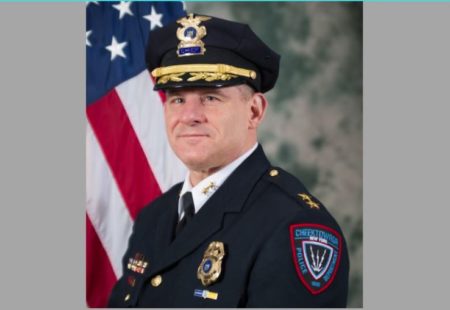


Decriminalize and Legalize!!!
That would be a huge relief to unjust arrests and community black market violence.
Absolutely agree- let’s ask ourselves, what is the purpose, the intent, behind criminalizing marajuana, if not to control young people, people of color, alternative people….and to bloat the budget for criminalizing behavior that a majority of the population engages in at one time or another? Isn’t one of the control mechanisms of fascism the criminalizing of behaviour that the majority of people engage in at one time or another?
‘grossly segregated’ says Gene Bell, Asheville’s BIGGEST segregationist! He should be ashamed to show his face in AVL !
public housing is NOT ‘over policed’ in AVL ! NO not at all Mr. Lance…